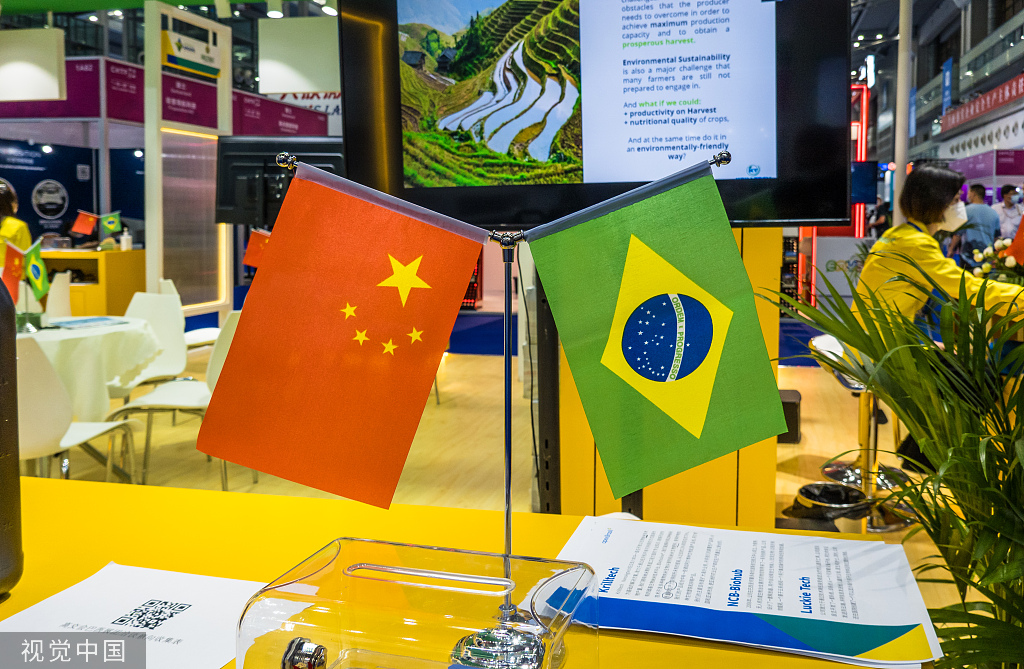Published: April 12,2023
By Chen Yuanting

The flags of China and Brazil at the booth of Brazil at the 24th China Hi-Tech Fair in Shenzhen, Guangdong province on Nov 15, 2022. [Photo/VCG]
That a 240-member business delegation is accompanying Brazilian President Luiz Inacio Lula da Silva on his upcoming state visit to China suggests 2023 will be a milestone year in China-Brazil relations. The year is also important because Xi Jinping was re-elected China’s president and Lula took office on Jan 1, starting his new term as Brazilian president.
Lula’s visit will push the China-Brazil comprehensive strategic partnership to a higher level, especially because the two countries have established a long-term relationship and Brazil was the first developing country to establish a strategic partnership with China.
Lula laid a solid foundation for strengthening bilateral relations during his two terms as Brazil’s president from 2003 to 2010. In fact, China-Brazil relations became a model of South-South cooperation. Lula’s presidency also saw a great leap in bilateral trade and institutionalization of inter-government exchanges, with the two sides working together to establish BRICS(a grouping of Brazil, Russia, India, China and South Africa).
The world, including many large developing countries, has undergone drastic changes because of factors such as the COVID-19 pandemic and the Russia-Ukraine conflict, which have also had huge impacts on the world order.
As such, the strategic need for a stronger China-Brazil relationship has increased. President Xi attached great importance to the development of the China-Brazil comprehensive strategic partnership in the congratulatory message he sent to Lula on his inauguration. Lula responded by bringing a large business delegation with him on his visit to China.
Economic cooperation between the two sides has made considerable progress in recent years, and bilateral trade increased despite the devastating impact of the pandemic on the global economy. For example, bilateral trade exceeded $100 billion for the first time in 2020 and reached a historic high of $171.49 billion in 2022.
Sino-Brazilian cooperation has expanded from traditional areas such as agriculture, animal husbandry, energy and infrastructure to emerging areas such as innovations in the field of science and technology, the digital economy and the green economy. Brazil is China’s biggest export destination, import source and investment destination in Latin America.
Besides, BRICS has entered the second “golden decade” of cooperation with influences beyond the five member states. BRICS has also played a constructive role in the growth of the global economy, and helped improve the global governance system and make international relations more democratic.
By cashing in on new opportunities, China and Brazil can further deepen bilateral cooperation. The two countries are likely to coordinate their development policies, and could facilitate common development through stable effective head-of-state talks, broader economic and trade cooperation, and increasing people-to-people exchanges.
Moreover, by fulfilling their responsibilities toward the international community, the two countries can promote closer multilateral cooperation. Indeed, China and Brazil should make greater contributions to the global economy and the international community, as both have benefited from economic globalization.
To this end, President Xi has put forward the Global Development Initiative, the Global Security Initiative, and the Global Civilization Initiative. The GDI calls for making more concerted global efforts to accelerate the implementation of the UN 2030 Agenda for Sustainable Development, and highlights eight priority areas of global cooperation — poverty alleviation, food security, COVID-19 medicines and vaccines, development financing, fighting climate change and promoting green development, strengthening industrialization, improving the digital economy, and boosting infrastructure connectivity. And the GSI urges the international community to make more efforts to maintain lasting peace by settling disputes through negotiation and consultation. And the GCI advocates nations to promote in-depth inter-civilization exchanges and dialogue to advance human civilizations through inclusiveness and mutual learning.
The initiatives will help resolve disagreements between and among countries, and promote peace and development. And by carrying out practical cooperation for the implementation of the two initiatives, China and Brazil can make big contributions to global prosperity and stability, which in turn will benefit the two countries and their peoples.
The author is an associate research fellow at the Institute of Latin American Studies, Chinese Academy of Social Sciences.
 Africa -China Review Africa -China Cooperation and Transformation
Africa -China Review Africa -China Cooperation and Transformation
